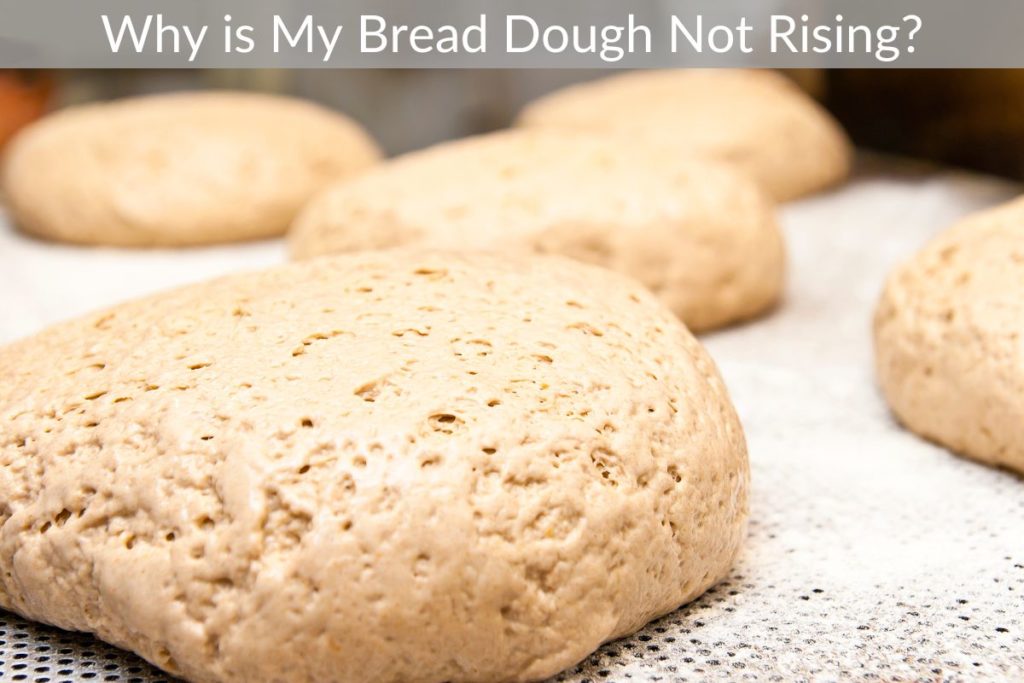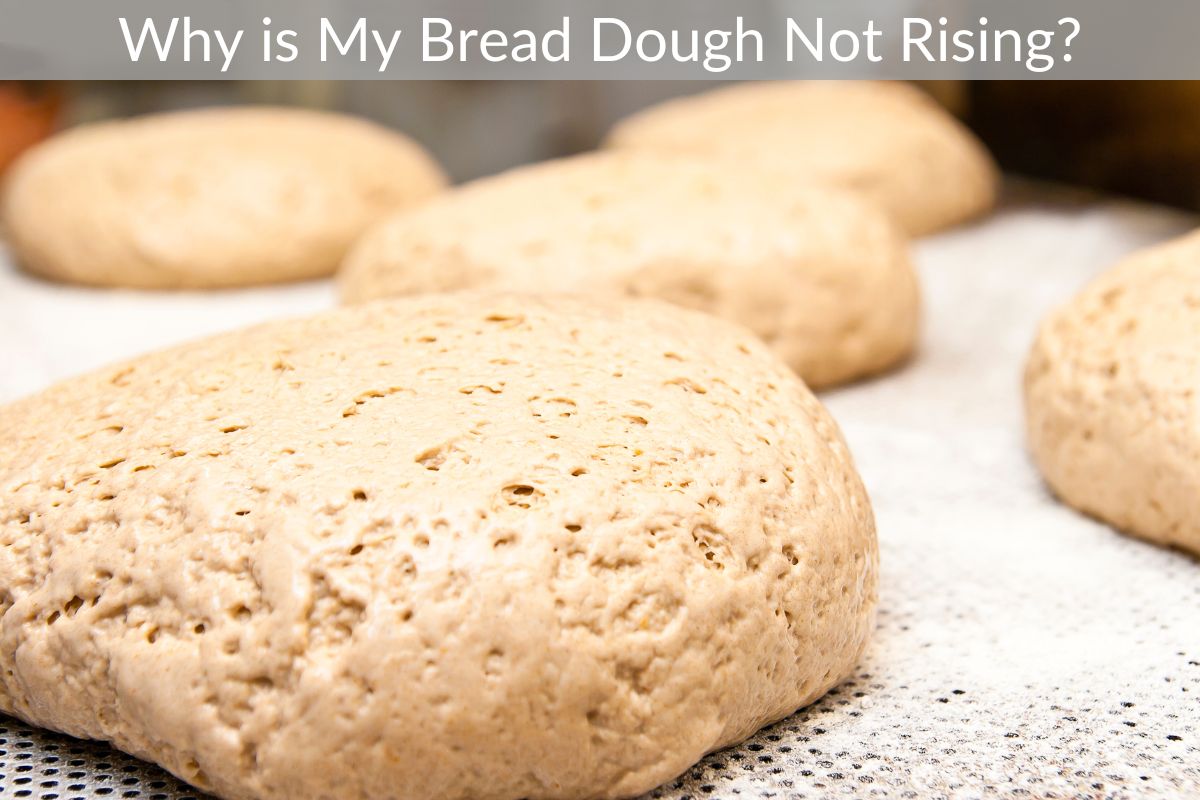There are several reasons why your bread dough may not be rising. It could be too dry, too wet, or too sticky. To determine if your dough needs to be increased in flour, feel it first. If it’s too wet, it will not form a round loaf and stick to your hands.
If the dough is too dry, add flour, but only up to a quarter cup at a time. If you still see no difference after adding flour, check the consistency of the dough.

Proofing bread dough
If your bread dough isn’t rising, you probably don’t have the right temperature. Generally speaking, the dough should be 75 to 78 degrees F. This temperature isn’t easy to achieve in hot weather, so you might have to adjust the baking pan’s temperature. To get the right temperature, you should place the pan on the lowest rack of the oven. Make sure to close the door while the dough is proofing.
Underproofed bread dough will shoot up by around 20%. This will create holes, ripped crusts, and tunnelling in the crumb. This is because yeast requires warmth and oxygen to ferment. A cold kitchen and ingredients slow the process. It also causes a slow rise. Proofing bread dough is crucial for making delicious bread. If you don’t follow the correct proofing time, the dough will not rise properly and will end up tasting like raw flour.
A common mistake that many bakers make is overproofing the dough. When the dough is overproofed, yeast has exhausted all of its energy and the dough lacks internal pressure. Eventually, the bread will collapse while baking and not rise. So how can you solve this? Follow the steps below. If the dough is overproofed, simply repeat the proofing process once again. If you don’t see any change after overproofing, you may need to increase the amount of time.
Another common mistake is under-proving the dough. Under-proofing will result in a heavy loaf, and over-proofing will result in a collapsing loaf. To prevent this, you should let the dough rise for a few hours before baking it. After the first rise, the bread will continue to rise, but it will not rise as much as it should. Proofing a loaf is a crucial step to make your bread more delicious.
To fix this problem, you should follow the directions for your recipe. To do this, you should place the proofed dough into the preheated oven. If you wait too long, the internal structure will collapse and the loaf will not rise at all. However, it’s best to leave it in the proofing cycle while baking the first loaf. Once you’ve baked the first loaf, repeat the process until your dough has reached the proper internal structure.
To prevent the dough from being overproofed, you should always use the right amount of yeast. You shouldn’t use too much because too much yeast will hinder its growth. Also, be sure to keep your proofing environment at a temperature that is suitable for the yeast. Proofing time is affected by room temperature and other parameters. Also, it’s important to know that yeast has a shelf life. Proofing the dough at room temperature may affect the results of your bread.
Over-kneading bread dough
What can you do when you over-knead your bread dough and it stops rising? First, try placing the dough in the refrigerator overnight. Cold temperatures slow yeast fermentation and relax stiff gluten. After the dough has been in the fridge for a few hours, you can return to kneading it more. It will probably have softened and become smoother by this time.
Another sign that your dough is over-kneaded is that it does not rise much when baked. Instead, it will be a tiny, hard loaf. You cannot over-knead the dough if it is hand-kneaded or mixed with a stand mixer. If you over-knead your dough, it will become tough to work with and the dough will feel dense and dry.
Over-kneading bread is an unfortunate common problem. Over-kneading causes the dough to become difficult to work with and even harder to stretch. It also tires you out! By hand-kneading your bread dough, you can tell when it’s tough and rippling. You’ll be able to prevent this problem by using the right amount of elbow strength.
Another common reason for your bread dough not rising is that you didn’t allow enough time to allow the yeast to work. Yeast needs time to work and is more active when it is kneaded. By not allowing the dough to rest for a day or two, your bread will not have a chance to rise. Then, make sure you follow the criteria below for proper kneading.
If your bread dough is over-kneaded, you need to check the gluten levels and let it rise again. An over-kneaded dough is hard to work with and will not rise properly. The gluten isn’t elastic enough and will tear easily if you try to shape it into a loaf. After the dough has risen for the required time, you can shape the dough and bake it.
If you’re a beginner, you should practice kneading the dough by hand. This method is incredibly time-consuming. Stand mixers have powerful motors that can over-knead the dough. Therefore, be sure to follow the recipe instructions and stop the mixer when the dough is dense and hard. You can also check the consistency of the dough by inspecting it every two to three minutes.
Another easy test to determine if your dough is over-kneaded is the windowpane test. When the dough is thin enough, you can stretch it without tearing it. If it does not stretch at all, it’s probably over-kneaded. If your dough breaks easily, continue to knead it for several minutes more. You can also perform a windowpane test by stretching the dough thin enough to see through it.
Too much sugar in bread dough
If your bread dough isn’t rising properly, you may be overfeeding it with sugar. While adding more sugar will result in a slower rising time, too much sugar can also stop it from rising at all. Adding too much sugar will also kill the yeast because it produces more alcohol. Yeasts can’t tolerate too much alcohol, so too much sugar will kill them. In addition to sugar, too much yeast can cause the dough to be sticky and hard.
One of the reasons why your bread dough doesn’t rise is because it doesn’t have enough flour. You can feel the consistency of the dough by handling it. If it is too wet, it will not rise, and if it’s too sticky, it will stick to your hands and won’t form a nice shape. To make sure that your dough rises properly, you must add some flour to it, but don’t add more than a quarter cup.
The reason for this is that sugar competes with yeast for water, which inhibits the yeast from proving. Sugar will cause the dough to rise slowly or not at all, so you should limit its use. If your bread dough is too sweet, you can use specialist osmotollerant yeast to prevent this effect. Also, avoid using excessive amounts of fat, which lubricate the gluten in the flour. These fats will also prevent the development of strong, flexible strands of gluten, which will result in a tighter structure that will not expand during the proofing process.
Adding baking soda is another way to prevent your bread dough from not rising. Adding baking soda to the dough will help the yeast rise properly, so be sure to add it to the recipe if you are using a high-quality yeast. If the dough does not rise in an hour, leave it another hour. Adding too much sugar can cause the dough to become dense. In addition to this, the temperature of the room can affect the rising time of the dough.
When kneading your bread dough, you should only add enough flour. If you have too much flour, the yeast will not be able to grow well. You should knead the dough on a floured surface before adding more flour. You shouldn’t need more than a cup of flour. You should only add more flour if your dough is sticky and isn’t rising.
Fats play a big role in the chemistry of baking. They help lubricate the dough and retain the gases that make the loaf rise and stay fresh. However, some reduced-fat ingredients can create problems. The reason for this is that they require more spread and mess with the water-yeast ratio. So, if you want your bread dough to rise, stick to ingredients that have at least 70 percent fat.

